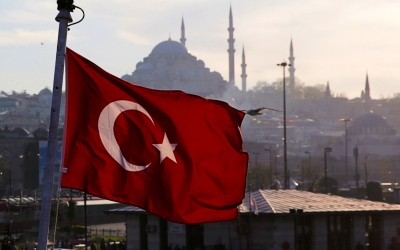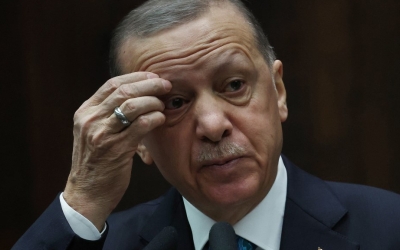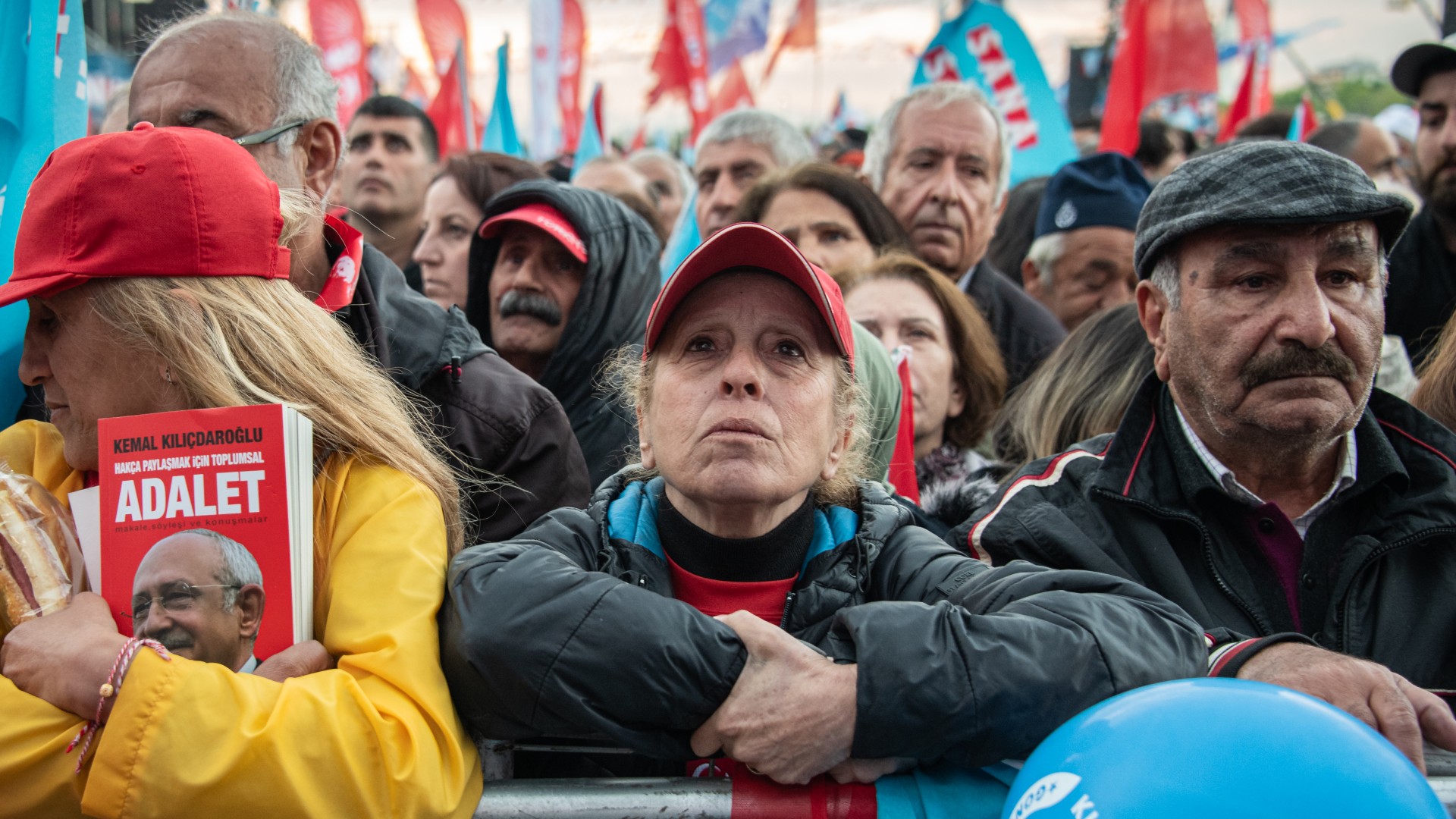Turkey elections: Why Europe is desperate to see Erdogan lose

The Economist has surpassed itself in its clearly expressed hatred for an elected head of state, Recep Tayyip Erdogan.
In its latest edition, it casts the Turkish presidential election as the most important that will take place this year, and claims that not just the future of Turkey but the future of democracy itself will hinge upon the result.
"Most important, in an era when strongman rule is on the rise, from Hungary to India, the peaceful ejection of Mr Erdogan would show democrats everywhere that strongmen can be beaten," it opines.
This is an enormously stupid thing to say.
It may have escaped The Economist’s attention but Turkey - under the hyper presidential rule of a strongman - is a country where a free election can still take place, in contrast to a region where dictatorship is the norm.
New MEE newsletter: Jerusalem Dispatch
Sign up to get the latest insights and analysis on Israel-Palestine, alongside Turkey Unpacked and other MEE newsletters
And this election is free. It's ferociously populist, polarised, and undoubtedly an uneven playing field in the access opposition parties have to the state media. But it is free and hard-fought.
Despite the Supreme Electoral Council's decision in 2019 to cancel the initial victory of Istanbul opposition mayoral candidate, Ekrem Imamoglu, on the grounds that the vote was too close (he won with a bigger majority in the rerun), Turkey’s electoral system is still robust.
All parties are present at the polling stations. They are present at every stage of the counting, transport of boxes and final count. Every ballot paper is confirmed or objected to by every political stakeholder.
Furthermore, it will be the seventh free election that Erdogan, whom the Economist dubs as a dictator, will have put himself through since he was elected mayor of Istanbul in 1994.
The other dictators
The Economist has devoted six other covers to the same theme for over a decade. All of them were aimed at Erdogan. Where are the similar condemnations of leaders who are - by general consent - far worse than the Turkish leader?
The Egyptian President Abdel Fattah el Sisi has just added 81 names of human rights defenders and journalists to its "terrorism list", which is now 6,300 strong. The list includes 32 Egyptian journalists from Al Jazeera, Al Sharq, Mekameleen, Watan, the Rassd Network, and other news websites critical of the government.
This is in addition to 60,000 political prisoners languishing and dying in Egyptian jails. Not a word, not a peep from those defenders of a value-driven foreign policy in the West.
And what about Mohammed bin Salman, Saudi Arabia's crown prince and prime minister, who had a journalist killed and dismembered, or business rivals hung upside down until they signed away their assets?
Does this colour The Economist’s view of a kingdom undergoing reform and modernisation? The Economist is by no means alone in throwing rational judgement out of the window about Turkey.
Der Spiegel, that paragon of German social democratic liberalism, pictured Erdogan sitting on a cracked throne behind him a crescent, the symbol of Islam, was breaking apart.
"In the 100th year of its existence, the Turkish Republic is at a crossroads: if Erdogan is confirmed in office for a second time, observers fear he could turn the country into a dictatorship; he could become ruler for life, abolish elections."
Can you imagine the uproar there would have been if Der Spiegel had put Israeli Prime Minister Benjamin Netanyahu, who has allied himself with terrorists and fascists, on a fractured Jewish throne, with the Star of David breaking up behind him?
Le Point seriously - and without any intended irony - compared Erdogan to Russian President Vladimir Putin. Both men, it argued, dream of a restoration of empire. Both have instrumentalised religion, and both have invaded other countries.
In Turkey’s case Le Point cites Turkey’s invasion of Northern Cyprus. This happened in 1974 when Mustafa Bulent Ecevit, a Kemalist and the CHP politician, was in power.
And then of course there is Turkey’s incursions in Syria, as well as Libya.
Am I forgetting something but are not American, Russian and Iranian troops also in Syria? Did not all western countries support the failed attempt to oust Bashar al-Assad? And has not Turkey just killed the last head of the Islamic State group (IS), which the western coalition are still fighting?
And in Libya was not Russia's Wagner mercenaries, the UAE, and Egypt behind the attempt to capture Tripoli, before Turkey intervened with its drones?
A European mental breakdown
This sort of commentary is not just wilfully littered with error and omission. For Turkey, all fact-checking has been temporarily suspended.
It is also mentally unhinged.
Erdogan is now dubbed an Islamist, even though his first act when the Muslim Brotherhood’s Mohamed Morsi came to power in Egypt was to call for secularism during his visit to Cairo.
Can you imagine the uproar there would have been if Der Spiegel had put Netanyahu on a fractured Jewish throne, with the Star of David breaking up behind him?
The truth notwithstanding, all manner of satanic force is now placed on his shoulders. He is deemed to threaten Europe’s democracy not merely because he is labelled an autocrat, but because he is Muslim.
This commentary reveals a European mindset in the throes of a mental breakdown. A psychiatrist would find this delirium richly informative.
To return to planet Earth for just one moment, Erdogan could well lose the presidential election.
If - as expected - he fails to win an outright majority in the first round on Sunday and opposition parties gain control of parliament, much would then depend on how the votes of the other parties split.
This election is indeed the tightest he has faced for 20 years. The opinion polls which have under law stopped being published in Turkey put the two main candidates as neck-and-neck and are all within the margin of error.
If Erdogan does lose, it will be because of inflation and the rising cost of living which has materially affected purchasing power, and for this he has only himself to blame.
He has gone through three central bankers in the process of pursuing a policy on interest rates which is untenable and has begun to empty Turkey's foreign exchange and gold reserves.
He may indeed signal a new and more orthodox monetary policy after the elections, but if he loses it is "the economy, stupid" not his authoritarianism that would have led to his downfall.
For the last segment of his period of office, Erdogan represented stability. In 2018 Turkey voted for stability over change. Now its been reversed. Turks want change. A whole generation has been moved up the social ladder and entered the middle class.
Now the sons and daughters of AK party loyalists are doctors and engineers who cannot afford the rent in Istanbul and who are in the midst of a real cost of living crisis. They yearn for opportunity and advancement, based on merit rather than political connection.
A one-man show
Presidential government under Erdogan has become a system where one man micromanages a huge government and civil service machine. His signature is required on the appointment of almost the bottom rung of the executive chain, invalidating the signatories of immediate superiors. Much indeed has to change.
Kilicdaroglu’s story of a return to parliamentary democracy and stronger institutions that are independent of the political power is appealing.
But for the moment, it is just that, a story.
Beneath him run powerful and less attractive currents to a European liberal audience, such as the populist racism of the CHP politicians being directed at Syrian refugees and Arab speakers in general, racism that was on show in the terrible aftermath of the recent earthquakes.
Kilicdaroglu has promised the earth, not least visa-free travel to Schengen countries within three months of gaining office. But so too did Erdogan arrive on the political stage committed to gaining entry to Europe, and so too did Erdogan come close in 2016 to negotiating a deal on visa-free travel.
Erdogan has learned from bitter experience to play hard ball with European capitals. As everyone who has studied the subject knows, the barrier to Europe does not lie in Turkey.
As far back as 1992 - 11 years before Erdogan came to power - Germany was sending mixed messages on Turkey joining the EU. Publicly, Germany's Foreign Minister Klaus Kinkel assured his counterpart that the federal republic backed Turkish entry.
Privately however, the then Chancellor Helmut Kohl, according to confidential papers published by the Institute of Contemporary History in Munich, revealed to Norwegian Prime Minister Gro Harlem Brundtland during his visit to Oslo: "We are against it."
And this was under Kohl, when liberal democracy was booming and good for business. Just imagine what the very thought of Turkey’s membership would be like today with the extreme right on the march in Germany, Italy, France, and Eastern Europe.
A barrage of hostility
Hatred of Islam and suspicion of Muslims has entered the political mainstream in Europe.
No one gets denounced, no political careers come to a premature end for anyone who taps into this rich stream of white nationalism.
On the contrary.
Kilicdaroglu is honoured to be thought of as Turkey’s Olaf Scholz in an interview on German TV. No doubt he is pleased be called Turkey’s Joe Biden too. In power, he will learn to rue these comparisons by a Turkish electorate who believed his promises and became quickly disillusioned.
Erdogan’s very flawed presidency is still light years ahead of what happens in Arab countries whose leaders declare arrogantly that their people are not mature enough or ready for free elections
He will learn the hard way that the real reason the West has expressed such hostility to Erdogan has nothing to do with his authoritarianism or his crackdown on a free press - neither of which stop the rush to invest in Saudi Arabia where such concepts are for the birds.
It is because Erdogan has fashioned Turkey into an independent state with its own powerful armed forces, that will not automatically toe the line dictated to it. This is the reason he has so many enemies in the West.
His popularity as a leader in the Sunni Muslim world is a threat to the failing and ailing western consensus. Independent leaders like Morsi or Pakistan’s Imran Khan all meet the same fate.
Erdogan has bucked that trend - so far.
He is crucified for being too close to Putin, and yet Turkey is one of the few countries in the region that can negotiate prisoner exchanges between Ukraine and Russia and keep the grain deal going, although possibly not for that much longer.
If the promised Ukrainian counter offensive falters, and Biden’s appetite for continuing to supply Kyiv with the rockets and shells it requires falters with it, it will be back to Ankara to arrange talks between the two sides.
Once again Turkey’s neutrality in this conflict will not be so unappealing to Western Europe.
Most analysis is predicated on the possibility that Erdogan will lose. But there are many scenarios left where he could win. The barrage of hostility from Europe has not gone unnoticed in Turkey.
When Erdogan called a mass rally in Istanbul’s old Ataturk airport, hundreds of thousands turned up. The figures may be disputed but the size of the throng surprised everyone in what is now an opposition-controlled city.
Democracy in action
If Erdogan does win, it will be because he persuaded the conservative voter to come back to the ruling Justice and Development Party (AKP) fold. These are not voters that readily surface in opinion polls, as they would not be living in large cities. But they still hold huge power in elections.
Kilicdaroglu’s strategy of splitting the conservative vote by getting on board two men who were Erdogan’s bedfellows in his first period of power, former Prime Minister Ahmet Davutoglu and former Foreign Minister Ali Babajan, will have failed.
If, as expected, the election goes to a second round, Erdogan still has cards to play, not least the appointment of two or more vice presidents who are established heavyweights in monetary and foreign policy. Kilicdaroglu on the other would have played his most important cards.
This is Turkish democracy in action. It's rough around the edges, it is missing for large periods between elections. There is much in the presidential system that needs changing. I, myself, was against it from the start.
I argued then that Turkey needs a robust and independent media. It needs independent institutions. Ministers need to be scrutinised by parliament, and not treated by the president as his private secretaries. It needs an independent central bank that commands the respect of the markets.
But Erdogan’s very flawed presidency is still light years ahead of what happens in the Arab countries whose leaders declare arrogantly that their people are not mature enough or ready for free elections.
Europe prays for Erdogan's downfall. In so doing, it is giving the Turks the biggest reason why they should make their own minds up, if they want to keep the independence for which their country has struggled for so long and so hard.
The views expressed in this article belong to the author and do not necessarily reflect the editorial policy of Middle East Eye.
Middle East Eye delivers independent and unrivalled coverage and analysis of the Middle East, North Africa and beyond. To learn more about republishing this content and the associated fees, please fill out this form. More about MEE can be found here.








